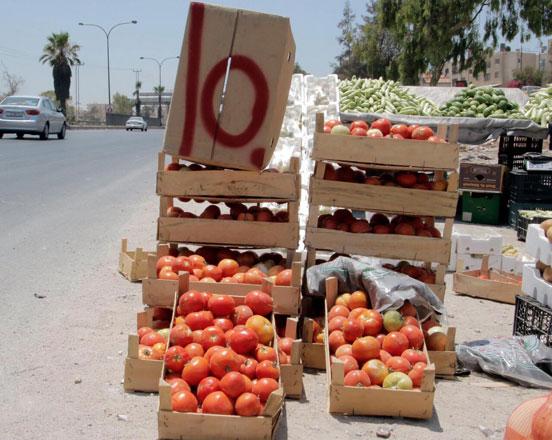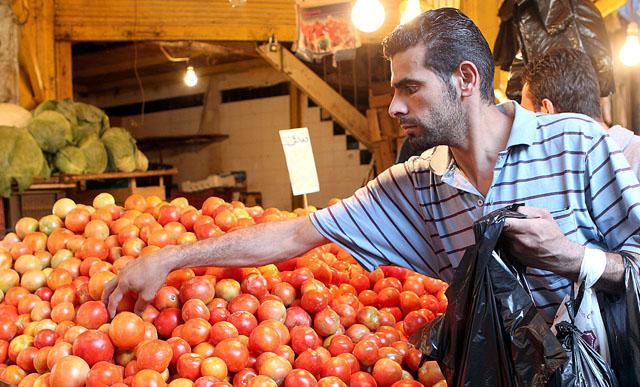You are here
Jordanians urged to continue boycotting tomatoes as agriculture sector dubs campaign 'misleading'
By Hana Namrouqa - Jul 16,2018 - Last updated at Jul 16,2018

Prices of tomatoes have dropped by 20-25 per cent, as many people decided to stop buying tomatoes because of its high price (Photo by Osama Aqarbeh)
AMMAN — The Consumer Protection Society (CPS) on Monday urged Jordanians to sustain their boycott of tomatoes, as leading agricultural institutions described the boycott campaign as “misleading”.
Mohammad Obeidat, CPS president, said that the boycott campaign which the society launched early this week has began to bear fruit, noting that prices of tomatoes in the local market have already dropped.
“Prices of tomatoes dropped today by 20-25 per cent, as many people decided to stop buying tomatoes because of [their] high price,” Obeidat told the Jordan Times.
He underlined that the CPS’ call for a boycott is a “peaceful weapon”, noting that the campaign seeks to inform people that they have the choice to reject the exploitation of traders.
Agriculture sector leaders, however, on Monday said that the boycott campaign of tomatoes is “misleading”, claiming that it is not based on a scientific judgement or true understanding of the nature of the agriculture sector and its production mechanism.
Thirteen leading agricultural societies and associations, including the Agricultural Engineers Association, the Jordan Valley Farmers Union, the Fruits and Vegetables Exporters and Producers Association and the Fruits and Vegetables Traders and Producers Society issued a statement saying that the agriculture sector suffers from a number of complex challenges, and that the “last thing it needs right now is misleading propaganda”.
In the statement, a copy of which was made available to The Jordan Times, the sector representatives attributed rising tomato prices to shrinking cultivated lands due to the high cost of labour, water, and energy and the levying of new taxes on production inputs.
They also claimed that climate changes during this year and the floods that inundated vast lands damaged a substantial portion of this year's tomato crop.
The statement said that the rise in tomato prices will be temporary due to rising demand with the arrival of expatriates, describing claims that the rise in tomato prices is because of importing the crop as “baseless”.
However, Obeidat urged Jordanians to continue with the boycott until the end of this week, noting that the fact that prices dropped shows that the campaign is achieving results.
Tomatoes are widely produced in Jordan and are one of the staple fruits that Jordanians consume daily, according to the Ministry of Agriculture’s previous statements, which also indicated that although 70 per cent of the Kingdom's exports of vegetables are tomatoes, there is usually an abundant surplus of the crop in Jordan.
A total of 500 tonnes of tomatoes are consumed daily in the Kingdom, with the fruit being produced in several parts of the country, including the Jordan Valley and the highlands, according to the ministry.
Related Articles
AMMAN — As prices of some vegetables have been on the rise over the past weeks, the Consumer Protection Society (CPS) accused retailers of b
AMMAN — The National Society of Consumer Protection (CPS) has recently expressed concerns over what it described as “steep” and “unrealistic
Jordan is among the top 10 world countries in terms of producing and exporting tomatoes, which constitute around 65 per cent of the total exported agricultural produce, according to officials.



















